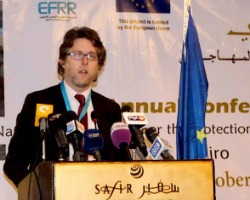Developing national mechanisms for the protection of refugees and migrants in Egypt
Posted on 17 October 2016

The conference sought to bring together stakeholders to discuss law and policy reform to improve the situation of refugees in Egypt. Martin's address challenged the participants, to use their collective experience "to design and advocate for a more comprehensive, unified response to the situation of refugees that meets the needs and capacities of refugee communities and Egyptian institutions, organisations working in Egypt, and the Egyptian public."
Mr. Reinhold Brender, Chargé d 'Affaires ad interim of the EU Delegation to Egypt, said about the conference and EFRR: "legal aid for refugees is life-saving, and women and girls, unaccompanied children, those who are illiterate, survivors of trafficking, gender-based violence, and torture are particularly vulnerable. By expanding legal advocacy for Refugees in Egypt, EFRR's project has contributed to ensuring that refugees benefit from the protection they're entitled to in Egypt."
The conference was organised by EFRR, the leading provider of legal aid to refugee in Egypt, and attracted more than 80 participants, including members of the diplomatic community; the leaders of international, intergovernmental and civil society organisations; leaders of refugee communities; and, local and international journalists.
Martin is a co-founder and vice chairman of EFRR. In 2016, EFRR provided direct legal assistance to more than 7,000 refugees in all parts of Egypt. EFRR is a partner in Martin's new ESRC Global Challenges funded research project seeking to learn from and expand the successes of refugee legal aid organisations in the Global South, using case studies from Egypt, India, Malaysia and Hong Kong.
